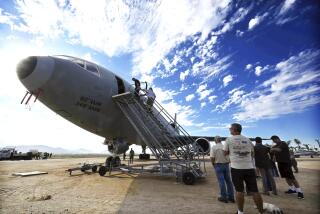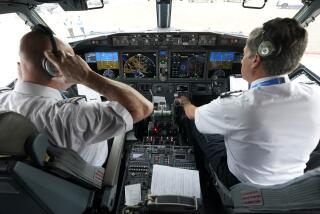Use of ‘Go Pills’ a Matter of ‘Life and Death,’ Air Force Avows
- Share via
BARKSDALE AIR FORCE BASE, La. — BARKSDALE AIR FORCE BASE, La. -- As a hearing investigating two American fliers who bombed Canadian forces in Afghanistan entered a third day Thursday, the Air Force summoned reporters to hear a pilot-surgeon extol the virtues of the service’s practice of prescribing amphetamines for tired pilots.
“It is the gold standard for anti-fatigue,” Col. Peter Demitry, chief of the Air Force Surgeon General’s Science and Technology division, said outside the military supply warehouse where the hearing is being held. “We know that fatigue in aviation kills. We have the smoking holes, the irreplaceable loss of life. This is a life-and-death insurance policy that saves lives.”
Lawyers for Maj. Harry Schmidt and Maj. William Umbach have said that the pilots’ judgment was impaired by amphetamines routinely prescribed by Air Force doctors. The two men, formerly full-time Air Force pilots who now are Illinois National Guardsmen, may be court-martialed for dropping a bomb that killed four Canadian soldiers and injured eight others near Kandahar in April. The pilots say they believed they were under fire from ground troops. But the Air Force says they failed to wait for clearance to fire. Seconds after the bomb was dropped, clearance was denied.
The hearing is being presided over by Col. Patrick Rosenow, who will recommend whether the men should be court-martialed. It is the first such proceeding in wartime on charges arising from “friendly fire.”
Demitry insisted Thursday that the drug Dexedrine -- called “go pills” by pilots -- “has never been associated with a proven adverse outcome in a military operation.”
“This is a common, legal, ethical, moral and correct application. This is not a cavalier program,” he added.
The stimulants are taken voluntarily, Demitry said: “At 30,000 feet in the middle of the dark sky, as a fighter pilot, no one is going to make me swallow a pill.”
The practice should not be compared to commercial airline policies that ban pilot use of amphetamines, he added. “When a civilian gets tired, the appropriate strategy is to land, then sleep,” he said. “In combat operations when you’re strapped to an ejection seat, you don’t have the luxury to pull over. There are no other options.”
Demitry said the drugs are dispensed in small doses to avoid the possibility of abuse. An average-size male gets one 10-milligram pill for every four hours of flight. Demitry said it is a “minuscule” dose that has a “very mild stimulant effect,” with possible side effects that include irritability.
Pilots unable to sleep before a mission are prescribed sedatives such as Ambien, he added. Charles W. Gittins, Schmidt’s lawyer, hinted in Thursday’s hearing that he would argue that Ambien also may have affected Schmidt’s mental state when he dropped the explosive.
On the night the Canadians were killed, Col. Lawrence Stutzrien was overseeing air patrols in Afghanistan from a control center in Saudi Arabia. In his second day of testimony, Stutzrien said he was aware that pilots were taking amphetamines.
Even so, any pilot flying over Kandahar should have known that the area was “friendly,” he said. Standing orders warned that coalition forces might hold exercises in the area, he said.
But Stutzrien conceded that the war in Afghanistan did not present a “linear battlefield.”
The extent of the confusion -- who was friend or foe -- was clear in a videotape of the bombing shot from Schmidt’s F-16 fighter. After Schmidt dropped the bomb, he asked the controller to confirm that it had not landed in a zone flagged for coalition forces. The controller concurred that firing in the area was not restricted.
More to Read
Sign up for Essential California
The most important California stories and recommendations in your inbox every morning.
You may occasionally receive promotional content from the Los Angeles Times.










